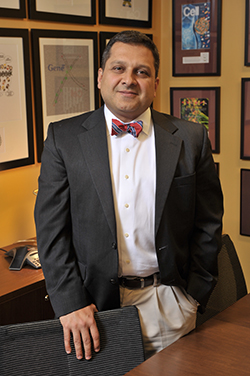
Transcription, the process in which genetic information from DNA is copied into RNA to produce proteins, requires many pieces coming together. In four recent publications, Ali Shilatifard, PhD, Robert Francis Furchgott Professor and chair of Biochemistry and Molecular Genetics, examined how the misregulation of these pieces can lead to cancer.
“We have learned that the machinery required for the initiation of transcription is regulated through an interaction with sequences upstream from a gene,” Shilatifard said.
This interaction occurs when proteins called transcription factors and an enzyme called polymerase II (Pol II) assemble at a DNA sequence near a gene. This spot is known as a promoter. From there, the transcription factors bind to a short sequence of DNA further away from the gene called an enhancer, creating a loop and activating transcription.
Mutations that make this molecular process go awry in the enhancer-promoter communication can have significant repercussions.
“That promoter-enhancer communication is very important for gene expression in a tissue-specific manner,” Shilatifard said. “We have proposed that enhancer malfunction can lead to cancer development.”
Learning how to stop the effects of point mutations in enhancer DNA sequences or transcription factors could have broad applications to many different types of cancer.
In the last two months, Shilatifard has authored four papers elucidating the topic of transcriptional regulation: In the first study published Jan. 1 in Genes & Development, Shilatifard and colleagues investigated Pol II that pauses at promoter sites.
“We are finding some new characteristics of Pol II that are stuck at promoter sites like glue. Using inhibitors of transcription initiation, Fei Chen, a graduate student in my laboratory dissected the mechanisms behind the Pol II that is releasing slowly from the sites and the Pol II that is sitting there, hard as a rock,” Shilatifard said.
In the second paper published Jan. 15 in the same journal, the Shilatifard lab contributed to findings that provided structural insights on a mechanism regulating histone methylation.
Next, in a review published Feb. 1 also in Genes & Development, Shilatifard and postdoctoral fellow Marc Morgan, PhD, explored how chromatin – genetic material that encompasses DNA, RNA and proteins – plays a role in cancer through transcription regulation, enhancer factors, histone gene mutations and genome stability via the heterochromatin pathway.
In the latest paper published Feb. 19 in Molecular Cell, Shilatifard and postdoctoral fellow Zhuojuan Luo, PhD, explored Zic2, a newly discovered factor that binds to enhancers and is required for embryonic stem cell specification.
“We looked into embryonic stem cells and found that the Zics are very important, not for activation, but for the repression of certain genes,” Shilatifard said. “Our study demonstrated that in embryonic stem cells, transcriptional silencing is an active process.”
Each of these papers is a step toward the ultimate goal of Shilatifard’s research: “If we can find inhibitors against the activities of these enhancer interacting factors, we may be able to apply it to prevent and treat cancer in patients,” Shilatifard said.






